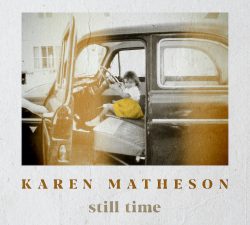A smooth-voiced Celtic offering amid the ghost of Robert Burns
 Karen Matheson is well known as the long term voice of Capercaillie though she has also produced 4 solo albums and now 5 with her most recent offering, ‘Still Time’, which has been recorded over the last 15 years. Fortunately, given that fact, it does not have the feel of odds and ends cobbled together in order to produce some, ‘product’.
Karen Matheson is well known as the long term voice of Capercaillie though she has also produced 4 solo albums and now 5 with her most recent offering, ‘Still Time’, which has been recorded over the last 15 years. Fortunately, given that fact, it does not have the feel of odds and ends cobbled together in order to produce some, ‘product’.
Matheson’s thirty-five year career will be known to many – the Transatlantic Sessions, ventures with American and world musicians, the closing of the Glasgow Commonwealth Games, honorary musical degrees and civic honours, albeit the lamentably named OBE. It is a stellar and glittering resume and as the saying goes, she does not really need an introduction.
The current album features four songs by James Grant, someone whose writing Matheson has admired for some time. There are two contributions from Robert Burns, two from musical and life partner Donald Shaw, and one each from Brendan Graham, Si Shaw and the McDonald brothers of Runrig fame.
The best tracks on the album are marked by their more directly Scottish subject matter as well as the simplicity of the arrangements which allow Matheson’s voice to shine more clearly. She has a lovely voice though it is not one you could call powerful. The album’s best tracks are those with the sparsest instrumentation which serves to better highlight the singer.
Robert Burns gets two bites of the cherry and it may be that his work encapsulates the artistic heartbeat of Matheson, Capercaillie and Scottish music, both new and traditional. Although there are some usages that need a little explanation, the sentiments are clear and it is no mystery as to why someone would choose his work, nearly 250 years old as these songs are. ‘Ae Fond Kiss’, which so memorably closed the Glasgow games (there are some clips of this performance on YouTube although they are not of the best quality) speaks clearly of the intensity of lost love,
“Nor never met – nor never parted / We would never have been sae broken-hearted“.
‘Lassie With the Lint White Locks’, carries a similar emotional charge with a simple final image and clear language,
“And when the howling wintry blast / Disturbs my Lassie’s midnight rest / Enclasped to my faithfu’ breast / I’ll comfort thee, my Dearie, O“.
‘Recovery’, written by Runrig’s McDonald brothers revisits the Crofters’ revolt in Glendale on the Isle of Skye which forced the authorities to negotiate rather than intimidate (though part of the deal was prison sentences for a token few, including McPherson who was seen as one of the ring leaders). These actions led to the Crofters Act of 1886 which started to address the grievances of the poor and dispossessed against the rich landowners. It is clear from the sleeve notes that this song and Runrig both had a profound effect on Matheson in the early 1980s, celebrating, as it does, the Gaidhealtachd (the Gaelic culture of the Highlands and Islands).
In, ‘Orphan Girl’, we hear the hopes of a child desperate to be taken to Australia from Ireland. This exodus grew from charitable and philanthropic motives with conditions in the workhouses notably hard and the famine years in Ireland at their peak. The diaspora of the Irish was even more significant than that of the Scots though in this instance the potential emigrant has great hopes,
“They say Australia is fine / They say Australia is fair / Australia is on my mind / And the fields of praties (potatoes) there.”
The Irish Times of October 2018 has this reality check:
“Expectations must have been high for their new life in the New World but, instead, they met a climate of fear and suspicion towards the influx of Irish refugees. As a result, the girls were widely criticised in the press and often subjected to abuse in the streets, with reports of exploitation and even mistreatment by unprincipled employers. Criticisms ridiculed their appearance, aptitude, abilities and moral fibre.”
These tracks are notable by way of their subject matter, the writing, arrangements and the way Matheson’s voice comes to the fore. The album also highlights the way that traditional music from this country bleeds so easily into the music of America, ‘Aragon Mill’, being a fine example. That mill could be anywhere.
Those fans of Capercaillie and Matheson will know what to expect – this is well crafted, well-sung music that won’t disappoint. To appropriate a Scottish metaphor, the impact is more akin to the sinuous quiet power of the lowland Tweed than it is the force and thunder of upland rivers such as the Orchy and the Etive.


